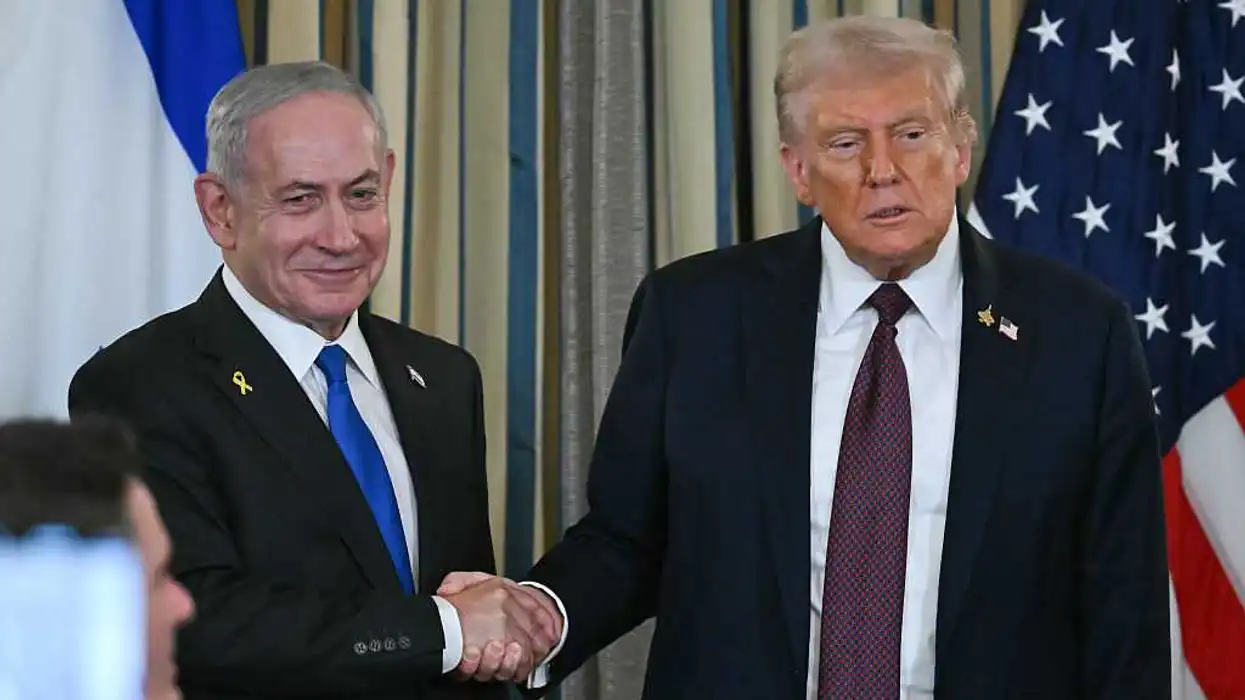The Roman historian, Tacitus, records the words of a doleful Briton defeated by the Roman legions who said, “You made a desert and called it peace.”
Any credible historian will concede that Rome, at its zenith, took on its enemies with overwhelming brute force. But the fact remains, beginning with the end of the reign of Augustus in AD 14, for 250 years, those living within the vast expanse of the Empire enjoyed the safety and security of the pax romana.
In the 5th century AD, as the Roman Empire of the West proceeded toward dissolution, the pitiable Romans were beset by unending invasions of Germanic tribes as well as Attila’s hordes of Eurasian Huns. One of the primary signatures of a declining civilization is its unwillingness and/or inability to defend its vital interests, allies, and ultimately its homeland.
With the Iran Pact, More American Allies Jump Ship
Reminiscent of John Kerry’s famous flip flop, French Foreign minister, Laurent Fabius called the new pact with Iran, a “sucker’s deal” before he later signed on to it. Left-wing pundit, Laura Secor, of the "New Yorker, " believes the agreement has the potential to be historic.
Prime Minister Benjamin Netanyahu, who views a nuclear-weaponized Iran as an existential threat to his country, condemned the pact as a “historic mistake.”
 Israeli Prime Minister Benjamin Netanyahu attends the weekly cabinet meeting at his office in Jerusalem, Israel, Sunday, Nov. 24, 2013. After feverishly trying to derail the international community's nuclear deal with Iran in recent weeks, Israeli Prime Minister Benjamin Netanyahu now has little choice but to accept an agreement that he has derided as deeply flawed. (AP Photo/Abir Sultan, Pool)
Israeli Prime Minister Benjamin Netanyahu attends the weekly cabinet meeting at his office in Jerusalem, Israel, Sunday, Nov. 24, 2013. After feverishly trying to derail the international community's nuclear deal with Iran in recent weeks, Israeli Prime Minister Benjamin Netanyahu now has little choice but to accept an agreement that he has derided as deeply flawed. (AP Photo/Abir Sultan, Pool)
But for this beleaguered administration, perhaps the most humiliating blowback of this pact was that of Iran’s Foreign Ministry Spokeswoman Marziyeh Afkham who told the Iranian press on last week:
“What has been released by the White House as a fact sheet is a one-sided interpretation of the agreed text in Geneva and some of the explanations and words in the sheet contradict the text of the Joint Plan of Action, and this has unfortunately been translated and released in the name of the Geneva agreement which is not true.”
Thus the Iranians don’t believe they’ve agreed to the terms that Secretary of State John Kerry and this administration say they have. Thus, the deal has the potential to attach to President Obama as a variation of his promise, “If you like your plan, you can keep it.”
With the Iran pact, Israel has become the latest, among a long list of former American allies such as Iraq and Egypt, who are now forging new strategic alliances outside the U.S. security umbrella. Breaking with a U.S. policy that has existed since the formation of Israel in 1948, this U.S.-brokered pact with Iran has pushed Israel to be estranged from the U.S. Stunningly, now, in the beginning of Obama’s second term, Israel is more closely allied with Saudi Arabia and the other Sunni kingdoms, Kuwait, Arab Emirates, Qatar who are engaged in a proxy war in Syria with Iran and its allies.
[sharequote align="center"]Appeasement of a ruthless outside power always invites aggression.[/sharequote]
Rumors abound that Israel and Saudi Arabia have struck a secret deal to attack Iran’s nuclear sites. Israel has recently conducted long-range air refueling exercises and taken the unprecedented step of posting footage of it on the internet.
Despite the predictable remonstrances from the mainstream media, most western defense policy experts see the pact as containing small or unimportant concessions by Iran, which garner it significant relief from economic sanctions. The enormous threat contained in the pact stems from the fact that Iran is allowed to keep its reactor grade enriched uranium which it can upgrade to weapons grade in a couple of months.
 A missile is launched during an Iranian army exercise in central Iran, Thursday, March 14, 2013. Iranian media say the military has test-fired several short-range missiles, including the type Palestinian militant Hamas group used to attack Tel Aviv last November. Credit: AP/Hadi Yazdani
A missile is launched during an Iranian army exercise in central Iran, Thursday, March 14, 2013. Iranian media say the military has test-fired several short-range missiles, including the type Palestinian militant Hamas group used to attack Tel Aviv last November. Credit: AP/Hadi Yazdani
What if Israel Decides to Act Alone?
I spoke to James Carafano, Vice President for Defense Policy, at the Heritage Foundation regarding the crisis facing Israel.
LK (Larry Kelley): I’ve read that if Iran develops nuclear weapon, Saudi Arabia has on order numerous finished weapons from Pakistan. Why does Iran need to build their own weapons and not just buy them?
JC (James Carafano): Because it makes it self-sufficient. It doesn’t make them dependent on someone else. Shipping finished weapons are easier to interdict. They’d likely face a Cuban missile crisis scenario. Also if North Koreans were caught shipping finished weapons, not just components, all hell breaks loose.
LK: Some members of Congress have announced they will try to block the Iran pact. What could they do?
JC: First, it’s a joint agreement with European signatories. So, American congress members can’t stop them from lifting their sanctions. Second, even if a bill to block the treaty got through (both houses of Congress) the president would veto it. Whatever they do will be symbolic. In practical terms, they can’t stop him (Obama).
LK: With Saudi help, can Israel completely destroy Iran’s nuclear programs?
JC: No. There are too many targets, not enough intelligence, and Israel doesn’t have enough military power. On the other hand, they (the Israeli’s) can send a very strong message. That’s actually worked before. In 2003, in the wake of Iraq invasion, Iran froze its nuclear program, fearing that they would be next. There is a possibility Israel could change Iranian behavior. (That same year Kaddafi, in 2003, fearing that he would be next, allowed US inspectors to completely dismantle the Libyan nuclear program and to ship the components to the US).
LK: Might Israel use an EMP weapon?
JC: Highly unlikely. It’s too blunt an instrument.
LK: In the event Israel strikes, what will be the likely counterattacks and can it survive them?
JC: Survive, probably yes. As to what the Iranians would do it’s hard to tell. They might not attack directly but through Hamas or Hezbollah. That’s why there’s such an internal debate inside Israel as to whether or not to do this (attack Iran’s nuclear sites). It’s not that they care about world opinion. They’re not sure what the Iranian response will be. It’s simply a very dangerous course of action.
[sharequote align="center"]Treaties made with ruthless despots are always fruitless and dangerous.[/sharequote]
Military Weakness and Appeasement are the Handmaidens of Decline
In my book, "Lessons from Fallen Civilizations ," I develop ten immutable laws that govern the fall of Great Civilizations. Law three reads:
," I develop ten immutable laws that govern the fall of Great Civilizations. Law three reads:
Appeasement of a ruthless outside power always invites aggression. Treaties made with ruthless despots are always fruitless and dangerous.
It’s predictable that, seeing our attempts to back away from sanctions on Iran at precisely the time they appear to be working, the Chinese would brazenly announce that they now govern the South China Sea, naming it their “air defense identification zone” or ADIZ. Two days later, after China’s announcement, America along with Korea and Japan sent military aircraft into the zone without asking for authorization.
However, one week later, the U.S. is now quietly asking Japan to file travel plans with China before navigating through or above China’s new waters. Yukio Okamoto, a former senior Foreign Ministry official said in an interview with Japanese press, “I can’t think of any case like this in the past where the U.S. took a step that hurt Japan’s interests over an issue directly related to Japan’s national security in a way visible to the whole world.”
So it seems we can now add Japan to the list of our allies seeking new security alliances.
President George Bush the younger once remarked, “Conducting American foreign policy is like playing chess in three dimensions.” In watching Bush’s successor, I agree with William Kristol who wrote, “As Iran moves closer to nuclear weapons, undeterred by the West’s leading power, a 21st century tragedy threatens to unfold…It is a strange course of events, heavy with historical irony, that has made the prime minister of Israel the leader of the West.”
–
TheBlaze contributor channel supports an open discourse on a range of views. The opinions expressed in this channel are solely those of each individual author.

 Israeli Prime Minister Benjamin Netanyahu attends the weekly cabinet meeting at his office in Jerusalem, Israel, Sunday, Nov. 24, 2013. After feverishly trying to derail the international community's nuclear deal with Iran in recent weeks, Israeli Prime Minister Benjamin Netanyahu now has little choice but to accept an agreement that he has derided as deeply flawed. (AP Photo/Abir Sultan, Pool)
Israeli Prime Minister Benjamin Netanyahu attends the weekly cabinet meeting at his office in Jerusalem, Israel, Sunday, Nov. 24, 2013. After feverishly trying to derail the international community's nuclear deal with Iran in recent weeks, Israeli Prime Minister Benjamin Netanyahu now has little choice but to accept an agreement that he has derided as deeply flawed. (AP Photo/Abir Sultan, Pool)





